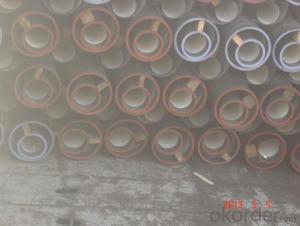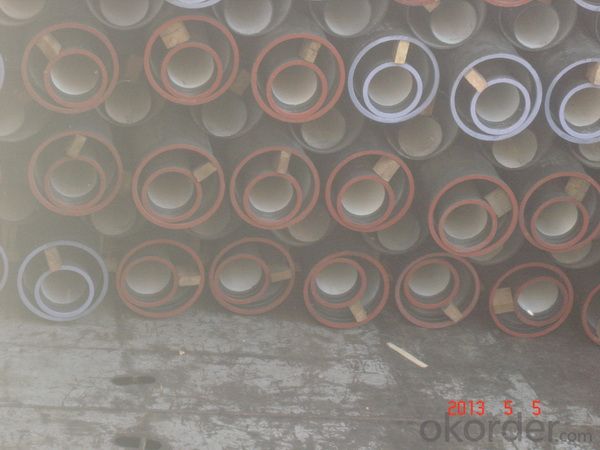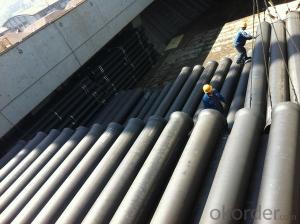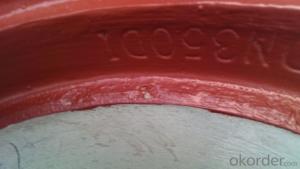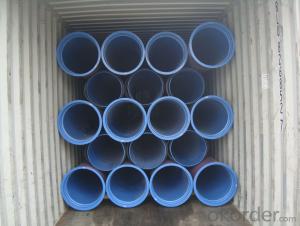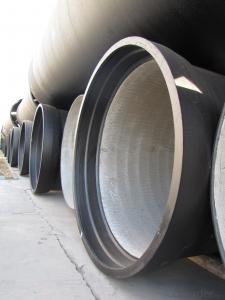T Type Ductile Iron Pipe DN350 Socket spigot pipe
- Loading Port:
- Tianjin
- Payment Terms:
- TT OR LC
- Min Order Qty:
- 200 m.t
- Supply Capability:
- 30000 m.t/month
OKorder Service Pledge
OKorder Financial Service
You Might Also Like
1) The standard of pipe: ISO2531:1998, EN545:2006,K9 K8
2) Effective length: 6m/5.7m
3) Inner cement line: Portland cement lineas per ISO4179
4) Zinc coating: at least 130g/m2 as per ISO8179
5) Bitumen painting: at least 70μm as per ISO8179
6)With 102% quantity of NBR, SBR, or EPDM ring asper ISO4633
7) DN80-DN1200
8) Highstrength, lighter than grey iron, good corrosion resistance, no furring, smallflow resistance, easy fixing, long life tome about 100 yeas
9)Checked by automatic inspection equipment
10) Composition:
Chemical composition | |||
Chemical composition | Ductile Cast Iron Pipe (%) | Grey iron pipe (%) | Steel pipe (%) |
C | 3.5-4.0 | 3.2-3.8 | 0.1-0.2 |
Si | 1.9-2.6 | 1.4-2.2 | 0.15-0.4 |
Mn | 0.15-0.45 | 0.4-0.6 | 0.3-0.6 |
P | ≤0.06 | ≤0.3 | 0.02-0.03 |
S | ≤0.02 | ≤0.1 | 0.02-0.03 |
Mg | 0.03-0.06 |
|
|
11) Feature:
Mechanical properties | |||
| Ductile Cast Iron Pipe | Grey Iron Pipe | Steel Pipe |
Tensile Strength(Mpa) | ≥420 | 150-260 | ≥400 |
Yield Strength(Mpa) | ≥300 | No Confirmation | No Confirmation |
Bending Strength(Mpa) | ≥590 | 200-360 | ≥400 |
Elongation (%) | ≥10 | Neglected | ≥18 |
Brinell Hardness(HBS) | ≤230 | ≤230 | About 140 |
12) T type mechanical joint
13) Packing: in bulk or container
PACKING: 1) Pipesare bundled together with the steel belt.
2) Wooden pieces are put between the pipes.
- Q: How does ductile iron pipe perform in areas with high traffic loads?
- Ductile iron pipe performs exceptionally well in areas with high traffic loads. Due to its superior strength and durability, it is highly capable of handling heavy loads and withstanding the impact caused by vehicular traffic. Ductile iron pipes have a high resistance to bending and cracking, making them ideal for applications in roadways, highways, and other high traffic areas. The high strength of ductile iron pipe allows it to distribute the weight and pressure exerted by heavy traffic loads more effectively, reducing the risk of deformation or failure. This makes it a reliable choice for transporting water, sewage, and other fluids in areas where heavy vehicles are commonly present. Additionally, ductile iron pipe has excellent corrosion resistance, which further enhances its performance in high traffic areas. It can withstand exposure to various environmental conditions, including moisture, chemicals, and abrasion, without compromising its structural integrity. This makes it a long-lasting and cost-effective solution, as it requires minimal maintenance and has a long service life. Furthermore, ductile iron pipe's smooth internal surface minimizes friction and allows for efficient flow of liquids, reducing energy consumption and maximizing the pipe's hydraulic capacity. This is particularly beneficial in areas with high traffic loads, where the demand for water or wastewater transportation is often greater. In summary, ductile iron pipe is a reliable and durable choice for areas with high traffic loads. Its strength, resistance to bending and cracking, corrosion resistance, and efficient flow characteristics make it an excellent option for transportation systems in roadways, highways, and other heavily trafficked areas.
- Q: Can ductile iron pipe be used for industrial wastewater applications?
- Yes, ductile iron pipe can be used for industrial wastewater applications. Ductile iron pipe is known for its strength, durability, and resistance to corrosion, making it suitable for various applications including wastewater systems. It can handle high-pressure and heavy-duty environments, making it ideal for industrial wastewater applications that may involve abrasive or corrosive substances. Additionally, ductile iron pipe can be easily installed and maintained, reducing the overall costs and ensuring long-term reliability. However, it is important to consider the specific requirements of the wastewater application and consult with professionals to determine the most suitable pipe material and design.
- Q: Are ductile iron pipes suitable for desalination plants?
- Yes, ductile iron pipes are suitable for desalination plants. They possess excellent corrosion resistance and durability, making them ideal for transporting seawater and brine solutions commonly found in desalination processes. Additionally, ductile iron pipes have high tensile strength, allowing them to withstand the high pressure and fluctuating temperatures associated with desalination operations.
- Q: Can ductile iron pipe be used for marine and offshore applications?
- Ductile iron pipe is suitable for marine and offshore applications due to its high strength and durability. It is well-known for its ability to withstand demanding environments and is particularly resistant to corrosion, including the corrosive effects of saltwater and harsh marine conditions. Moreover, its ductility allows for flexibility and resistance to cracking or fracturing under high-pressure conditions. These exceptional properties make ductile iron pipe a dependable choice for transporting fluids and gases in marine and offshore industries, such as offshore oil and gas platforms, marine structures, and underwater pipelines. To further enhance the corrosion resistance of ductile iron pipes in marine and offshore applications, it is essential to utilize proper coating and cathodic protection systems.
- Q: How do ductile iron pipes perform in high-velocity water flow conditions?
- High-velocity water flow conditions are easily handled by ductile iron pipes. Their composition and manufacturing process give them remarkable strength and durability, making them highly resistant to the forces generated by fast-flowing water. These pipes are specifically designed to endure significant hydraulic pressure and turbulent conditions. Their inherent ductility allows them to absorb the energy of the flowing water and effectively dissipate any potential stress or impact that may arise. Furthermore, the smooth internal surface of ductile iron pipes reduces frictional losses, ensuring efficient water flow even at high speeds. This characteristic is vital in maintaining the necessary water pressure and flow rates in various applications, including water distribution systems, sewage networks, and industrial processes. Additionally, the corrosion resistance of ductile iron pipes enhances their performance in high-velocity water flow conditions. Typically, these pipes are lined with cement mortar or polyethylene, providing extra protection against the corrosive effects of fast-flowing water. In summary, ductile iron pipes are perfectly suited for high-velocity water flow conditions, offering exceptional strength, durability, and hydraulic efficiency. Their ability to withstand the challenges posed by fast-flowing water makes them a reliable choice for a wide range of applications where high water velocity is a concern.
- Q: Can ductile iron pipe be used for cooling water systems?
- Yes, ductile iron pipe can be used for cooling water systems. Ductile iron pipe has excellent corrosion resistance, high tensile strength, and is capable of withstanding high-pressure conditions, making it suitable for various applications, including cooling water systems. Its durable and versatile nature allows it to effectively transport and distribute cooling water without the risk of leakage or failure. Additionally, ductile iron pipe is known for its long service life and low maintenance requirements, making it a cost-effective choice for cooling water systems.
- Q: Ductile iron pipe joint leakage
- After cleaning the pipe mouth, the cf-2000 high efficiency composite waterproof agent is used to seal it, and it will not leak.
- Q: Can ductile iron pipes be used for trenchless installations?
- Indeed, trenchless installations can utilize ductile iron pipes. Horizontal directional drilling (HDD) and pipe bursting techniques have gained considerable popularity as alternatives to the conventional open-cut trenching method for underground utility installations. Ductile iron pipes possess the necessary qualities of strength, durability, and flexibility, rendering them suitable for trenchless installations. They can endure the formidable forces encountered during HDD and pipe bursting operations without jeopardizing their structural integrity. Moreover, ductile iron pipes exhibit remarkable resistance to corrosion, establishing them as a dependable option for trenchless applications.
- Q: How does ductile iron pipe perform in extreme weather conditions?
- Ductile iron pipes are renowned for their exceptional performance in adverse weather conditions. These pipes demonstrate remarkable durability, resistance, and flexibility, making them suitable for enduring harsh weather such as extreme temperatures, heavy rainfall, snowfall, and even earthquakes. One of the notable characteristics of ductile iron is its capacity to withstand damage caused by freezing temperatures. Unlike other materials, ductile iron pipes possess a low coefficient of thermal expansion, enabling them to resist the expansion and contraction that occurs during freeze-thaw cycles without experiencing cracks or breaks. Consequently, these pipes remain intact and continue to function optimally even in extremely cold conditions. Furthermore, ductile iron pipes exhibit excellent resistance to corrosion, rendering them highly resilient to the corrosive effects of severe weather. They are shielded by a sturdy zinc coating, which acts as a barrier against rust and other forms of corrosion. This coating, in conjunction with the inherent strength of ductile iron, grants these pipes exceptional resistance to the corrosive effects of rain, snow, and moisture. Moreover, ductile iron pipes possess superior flexibility, allowing them to accommodate ground movement and seismic activity. In areas prone to earthquakes or soil shifting, these pipes can absorb stress and strain without fracturing, guaranteeing a continuous supply of water and sewage services even in the most challenging weather conditions. Overall, ductile iron pipes excel in extreme weather conditions due to their durability, resistance to freezing, corrosion, and flexibility. Their ability to withstand the elements ensures an uninterrupted supply of water and sewage systems, providing reliability and peace of mind to utility providers and communities, even in the most unforgiving environments.
- Q: Are ductile iron pipes suitable for use in brewery facilities?
- Yes, ductile iron pipes are suitable for use in brewery facilities. Ductile iron pipes are durable, corrosion-resistant, and can withstand high-pressure applications, making them ideal for transporting water, steam, and other fluids within brewery facilities. Additionally, the smooth interior surface of ductile iron pipes minimizes friction and prevents the build-up of sediments or organic materials, ensuring the purity and quality of the beer being produced.
Send your message to us
T Type Ductile Iron Pipe DN350 Socket spigot pipe
- Loading Port:
- Tianjin
- Payment Terms:
- TT OR LC
- Min Order Qty:
- 200 m.t
- Supply Capability:
- 30000 m.t/month
OKorder Service Pledge
OKorder Financial Service
Similar products
Hot products
Hot Searches
Related keywords
